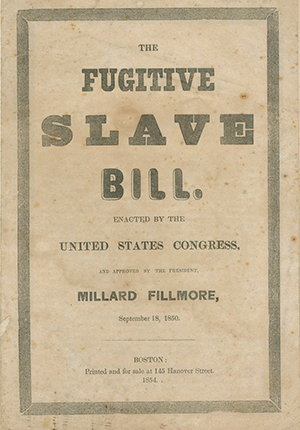Looking Back to Move Forward
There is a chapter in Emotionally Healthy Spirituality entitled “Going Back in Order to Go Forward.” Part of spiritual formation is learning from our personal and collective histories. We also find history in Scripture, and that is intentional. We look at history to lament, to recognize sinful patterns, and to hear the warning to cease, but also there is a call to remember the faithful witnesses along the way. So, as we continue Black History Month, we can learn about our present witness from aspects of Black history.
You can check here each week for a brief snapshot highlighting an aspect of African-American history. We will celebrate the efforts of so many to make America a better place for all its people to live, and we will praise God for His sovereign hand, which moved among them.
“No Person held to Service or Labour in one State, under the Laws thereof, escaping into another, shall, in Consequence of any Law or Regulation therein, be discharged from such Service or Labour, but shall be delivered up on Claim of the Party to whom such Service or Labour may be due.” - United States Constitution Article 4, Section 2, Clause 3
“And be it further enacted, That when a person held to service or labor in any State or Territory of the United States has heretofore or shall hereafter escape into another State or Territory of the United States, the person or persons to whom such service or labor may be due, or his, her or their agent or attorney, duly authorised, by power of attorney, in writing, acknowledged and certified under the seal of some legal office or court of the State or Territory in which the same may be executed, may pursue and reclaim such fugitive person...” - Excerpt from The Fugitive Slave Act, Section 6, 1850
“You shall not give up to his master a slave who has escaped from his master to you. He shall dwell with you, in your midst, in the place that he shall choose within one of your towns, wherever it suits him. You shall not wrong him.” - Deuteronomy 23:15-16, ESV
“He decreed statutes for Jacob
and established the law in Israel,
which he commanded our ancestors
to teach their children,
so the next generation would know them,
even the children yet to be born,
and they in turn would tell their children.
Then they would put their trust in God
and would not forget his deeds
but would keep his commands.
They would not be like their ancestors—
a stubborn and rebellious generation,
whose hearts were not loyal to God,
whose spirits were not faithful to him.”Psalm 78:5-8, NIV
Scripture presents history as one of the ways God called His people to remember their failures, repent of their ways, and return to His covenantal culture spelled out in His law. In doing so, God’s ancient people would express their trust in Him and His ways for a flourishing life and society in the land He gave to them.
Thankfully, God’s present people can use America’s history in a similar way. It’s not that we’re a specially chosen people like the ancient Hebrews, rather we acknowledge that many believe America’s moral foundation rested on a Judeo-Christian moral ethic. As Mark David Hall once wrote, “In short, while America did not have a Christian Founding in the sense of creating a theocracy, its Founding was deeply shaped by Christian moral truths.” And if many professing Christians believe America’s founding was deeply shaped by a Judeo-Christian ethic, then it’s imperative to take an honest look at this country’s history to see if and how its practices, functional beliefs, and laws deviated from that ethic.
For believers today, remembering America’s history, along with the practice of repentance and return to our Lord, is critical for our witness of the person and work of our Lord Jesus Christ. If we find instances where this country through practice or law (systematic practice connected with an ethical conviction) deviated from Scripture it must be noted, learned from, and then corrected in our present practices and laws.
The Fugitive Slave Act of 1850 was an instance of American systematic injustice that directly contradicted Scripture. One interesting fact about the Fugitive Slave Act is how it compelled those who sought to be obedient to Deut. 23:15-16 to either violate their conscience or face legal consequences (sections 5 & 7). Moreover, the Fugitive Slave Act was an instance in which the living God’s clear command regarding a vulnerable people group was not only ignored but completely violated. It, therefore, did great violence and harm to Black people (both enslaved and free Black persons were forced into slavery through this law) along with utterly corrupting the witness of our faith.
For some, reviewing certain aspects of Black history can be uncomfortable and even cause irritation and anger. But as God’s people who claim to represent Christ today we cannot shut our eyes to the history of a vulnerable people group and their treatment in a land said to be founded on Christian morality that flows from our Lord Jesus Christ. We cannot since doing so runs the risk of falling into the same historical patterns of God’s ancient people who continued to resist Him and His call. Our goal isn’t to engender some kind of false guilt or shame. Rather it is to heed God’s call that following His patterns and ways in our societal practices and laws is the pathway to flourishing life and an authentic witness of the person and work of our Lord Jesus Christ.
Hopefully reviewing our history through a biblical perspective will empower us to ask if our present practices and laws disregard Scripture’s teachings and Christ’s stance to the vulnerable and easily marginalized.
You can read a bit about the various Fugitive Slave Acts here.
Cited Sources:
Mark David Hall, Did America Have A Christian Founding? The Heritage Foundation. June 7th, 2011. https://www.heritage.org/political-process/report/did-america-have-christian-founding
“What Were the Fugitive Slave Acts?”, History.com, https://www.history.com/topics/black-history/fugitive-slave-acts

